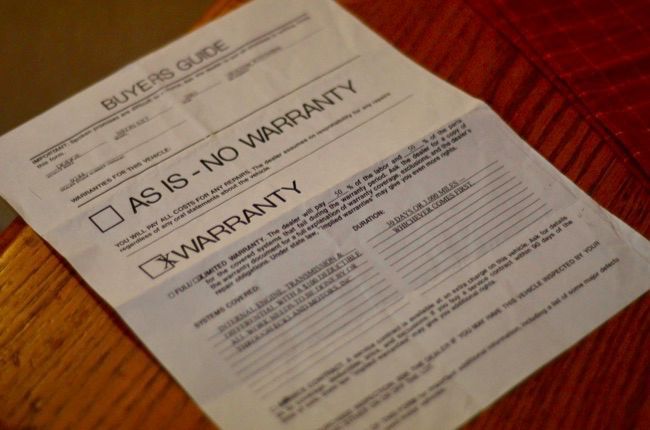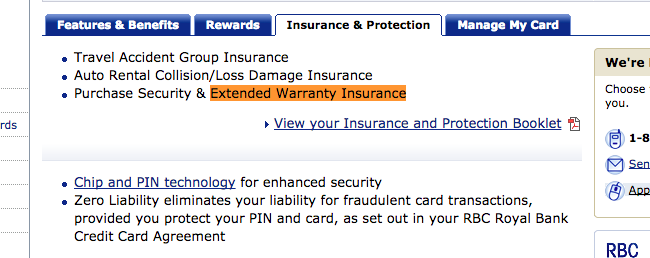Quick Links
We've often received blank stares and looks of confusion when mentioning that our credit card company is covering a repair via its extended warranty. Yes, your credit card may provide free extended warranties, too!
Retailers of all stripes want to sell you extended warranties, but don't forget: Your credit card may be providing you with a free warranty extension on such purchases already, saving you money.
How It Works
In a nutshell, here's how it works:
- Your credit card agreement may provide an "extended warranty" benefit alongside its other bonuses. This will be clearly mentioned in your credit card agreement or list of benefits.
- You must purchase the item entirely with your credit card to receive the warranty. Let's say you want extended warranty for the laptop -- you must pay in full with the credit card that offers the extended warranty protection.
- The manufacturer's warranty is valid for the standard period of time. For example, if you buy a laptop and it has a one-year warranty, you'd need to bug the manufacturer and use their RMA process if your laptop fails in the first year.
- After the manufacturer's warranty expires, your credit card company will often provide "double the warranty" up to one year of additional coverage. So, if the warranty is for six months, you'll get another six months. If the warranty is for one year, you'll get another year. If the warranty is for two years, you'll just get an additional year. The limit is often five years, so you probably can't get a sixth year of warranty.
- The manufacturer's warranty terms will usually still apply. So, if the warranty says water damage isn't covered, the credit card company probably won't pay for a phone that stopped working after you dropped it in the toilet.
- The manufacturer knows nothing about this credit-card-provided warranty. If a device fails, you'll have to file a claim with the credit card company. They'll have you provide details about the problem and either send your device in to be fixed, or -- more likely -- tell you to have it repaired and then mail you a check for the cost of the repairs.
Only "tangible goods" are generally covered by this warranty. This means laptops, tablets, computers, electronics, and other tech equipment and gadgets are fair game. However, if you paid for a yoga retreat that promised freedom from worry for a year, you can't get your credit card company to cover a new yoga retreat if you start worrying again after a year and a half.
Using the Extended Warranty
The process of using the warranty involves contacting your credit card company. They'll provide instructions on their website and in the credit card agreements themselves. You'll generally have to provide a copy of the original receipt, and a copy of the credit card statement showing the purchases. You should be keeping this type of paperwork for items you might need warranty protection on, anyway!
You'll have to fill out a form with details about the problem. This isn't a typical RMA process -- you'll generally have the item repaired at your expense somewhere and the company reimburse you. You can have the original manufacturer perform a repair and charge you for it -- if the credit card company decides you're eligible, they'll reimburse you for the repair or replacement expense.
You might expect it'd be like pulling teeth to get your credit card company to give you a single cent, but it hasn't been that difficult in our experience. Part of the reason why might be that so few people know this benefit exists and take advantage of it.
Why Would Credit Card Companies Offer This?
Credit card companies aren't known for doing things just out of the goodness of their hearts. So what's the catch here? What are credit card companies getting out of this?
Well, it's actually not as sinister as you might expect -- at least from the consumer side. Credit card payments have higher fees for merchants. A merchant might pay two percent of each transaction to the credit card company when you use credit, while debit cards cost the merchant a flat fee of a few cents per transaction.
This is why credit cards offer so many more protections in general -- easier cancellation of charges you didn't make, chargebacks to help protect you, cashback (the credit card company is sharing the profit with you), and even extended warranties.
In other words, it's coming out of the higher amount they're charging merchants. They want you to think "I should buy this expensive item on my credit card so I can get an extended warranty" and use your credit card instead of debit or cash. This is inconvenient for merchants, but it's good for people paying with credit cards
Does Your Card Offer This?
So, does your card offer this extended warranty protection? To know for sure, you'll have to check your credit card agreement or the list of benefits provided on your card issuer's website for your particular card. Contrary to what you might think, this isn't a fancy feature available only to people paying yearly fees for "exclusive" credit cards -- we've seen it on rock-bottom, no-fee credit cards, too.
Check out your cardholder agreement to know for sure. VISA and MasterCard cards both often offer this, and it's also a feature of American Express cards.
This bonus benefit has existed for a long time, but it's particularly relevant to geeks and anyone who purchases gadgets. Did a piece of technology fail just after its warranty period expired? Good news: Your credit card company should pay for the repair or replacement. You just have to know this benefit exists!
Image Credit: Philip Taylor on Flickr, Sean MacEntee on Flickr, trenttsd on Flickr





